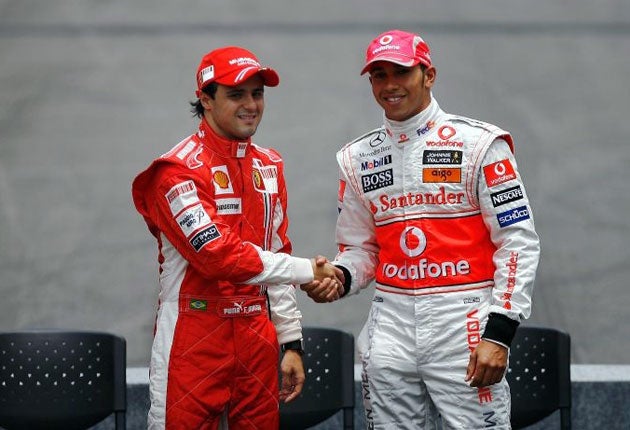F1 title to go to winner of most races
Driver will be crowned champion even if a rival gains more points during season

The 2009 Formula One world champion will be the driver who wins the most races, the sport's governing body, the FIA, declared yesterday.
As the World Motor Sport Council (WMSC) met in Paris, the governing body put the Formula One teams in their place by rejecting their suggestion of a modified points system in favour of the proposal put forward by the sport's rights holder, Bernie Ecclestone, who suggested that the driver who wins the most grands prix in a season should be crowned champion.
Ever since Lewis Hamilton, with five victories, beat Felipe Massa, with six, to the 2008 World Championship by a single point, Ecclestone has campaigned for a system of medals for the top three in each race. FOTA, the association of Formula One teams, preferred a change to the current 10-8-6-5-4-3-2-1 scoring system, making it 12-9-7-5-4-3-2-1 points for the first eight finishers.
The FIA did not go for the medal idea, but ruled that while the current points system will remain, the champion will be the driver with the most victories, even if another driver scores more points. The points system will be used to determine the remaining championship positions and in the case of two or more drivers winning the same amount of races during a year. The Constructors' Championship remains unchanged.
"The WMSC accepted the proposal from [Ecclestone's] Formula One Management to award the drivers' championship to the driver who has won the most races during the season," an FIA statement said.
"The rest of the standings, from second to last place, will be decided by the current points system. There is no provision to award medals for first, second or third place."
The FIA recently issued research indicating 13 occasions on which the championship would have been won by a different driver if number of wins had been the decisive factor. Most notably, Stirling Moss would have been champion in 1958. In addition, Jim Clark, Ayrton Senna and Nigel Mansell would have added two more titles, and Massa would be the current world champion.
The FIA also introduced a voluntary budget cap for the 2010 season. This will be set at £30m per team per season, and is an effort to encourage teams such as newcomer USGPE. Those who sign up to the option will be allowed a degree of technical freedom so that they will be able to compete with teams that opt to continue with unlimited budgets.
"The technical freedoms accorded to the low-budget teams will be adjusted from time to time to keep their median performance on a par with the median performance of the unlimited-expenditure teams," a statement said.
"The regulations for the unlimited-expenditure teams will remain stable and fixed," said the FIA president, Max Mosley: "Everything except the motorhome and any fine imposed by the FIA will be included [in the budget cap], even the salaries of the drivers and team principal.
"If the team is profitable, it can pay a dividend to its shareholders, who may well include a chief engineer, team principal or even a driver. But we would make sure the team was genuinely making enough profit to cover the dividend."
The technical freedoms for capped teams include a standard but more aerodynamically efficient underbody, movable wings, no engine rev limit, no restriction on the number or type of updates, no homologation requirements and no limits on materials, testing, simulators or wind tunnels.
Mosley promised that rigorous auditing procedures would be applied to ensure fair play.
Win or lose... The new points system
* The F1 champion will be the driver with the most victories, even if another driver scores more points.
* The existing points system will be used to determine the remaining championship positions, and in case two or more drivers win the same amount of races during a year.
Join our commenting forum
Join thought-provoking conversations, follow other Independent readers and see their replies
Comments
Bookmark popover
Removed from bookmarks